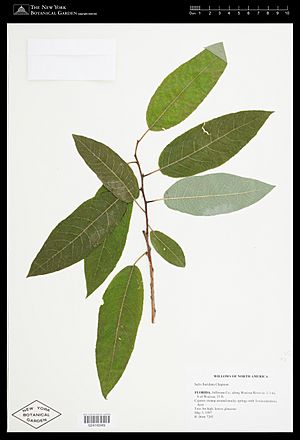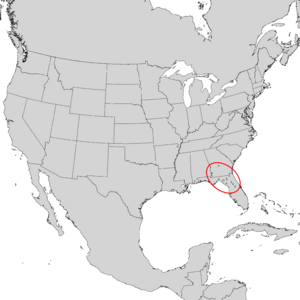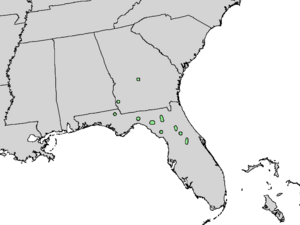Florida willow facts for kids
Quick facts for kids Florida willow |
|
|---|---|
 |
|
| Conservation status | |
| Scientific classification | |
| Genus: |
Salix
|
| Species: |
floridana
|
 |
|
| Natural range of Salix floridana | |
The Florida willow (scientific name: Salix floridana) is a special type of willow plant. It belongs to the Salicaceae family, which includes many kinds of willows and poplars. This plant naturally grows in the southeastern United States. You can find it in northern Florida and southwestern Georgia.
Contents
What the Florida Willow Looks Like
The Florida willow can be a deciduous shrub or a small tree. "Deciduous" means it loses its leaves every autumn. It can grow up to 6 meters (about 20 feet) tall.
Leaves
The leaves of the Florida willow grow in an "alternate" pattern, meaning they don't grow directly opposite each other on the stem. Each leaf is usually 5 to 15 centimeters (2 to 6 inches) long and 2 to 5 centimeters (1 to 2 inches) wide. The edges of the leaves have very small, fine teeth, which is called a "finely serrated margin." The top side of the leaf is green, while the underside is lighter in color and has short, whitish hairs.
Flowers and Reproduction
The Florida willow produces its flowers in early spring. These flowers appear before the new leaves start to grow. The flowers are found in structures called catkins, which look like fuzzy, hanging cylinders.
This plant is "dioecious." This means that male flowers and female flowers grow on separate plants. So, one Florida willow plant will have only male catkins, and another will have only female catkins.
- Male catkins are usually 4 to 5.5 centimeters (1.6 to 2.2 inches) long.
- Female catkins are a bit longer, typically 5 to 7.5 centimeters (2 to 3 inches) long.
Where the Florida Willow Lives
The Florida willow is native to a specific part of the southeastern United States. It grows naturally in the northern areas of Florida and the southwestern parts of Georgia. This makes it a unique plant to these regions.
See also
 In Spanish: Salix floridana para niños
In Spanish: Salix floridana para niños



